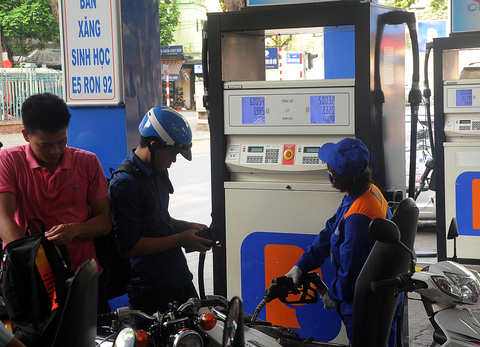
Customers filling their motorbikes at a fuel station on Tran Hung Dao Street in Hoan Kiem District, Ha Noi. — VNA Photo Quang Quyet
A new deadline – January 1, 2018 – has been set for the nation to make a complete switch from the popular RON A92 petrol to biofuel E5, but many obstacles lie in the path of achieving it.
These include a lack of consumer confidence in the new product and problems in re-quipping petrol stations to store and serve the new fuel.
According to the Cong Thuong (Industry & Trade) newspaper, the Ministry of Industry and Trade (MoIT) has set January 1, 2018 as the new deadline for the switch from RON A92 to biofuel E5, the latter being a mix of A92 petrol (95 per cent) and bio-fuel Ethanol (5 per cent).
Deputy Minister of Industry and Trade, Hoang Quoc Vuong, has asked relevant agencies to finalise a report on having both fuel types in use until December 31, 2017.
The MoIT has also instructed that by October 2017, petrol traders need to urgently complete constructing E5 plants to meet local and national demand so that only E5 is supplied nationwide from January 1, 2018 onwards.
The Ministry of Finance will adjust prices of the biofuel offering it initially at VND500 to 1,000 per litre lower than RON A92, to attract customers and encourage them to use the new environmental-friendlier fuel.
Earlier local media reports had noted that the MoIT had said on its online portal that it “may completely replace all A92 with E5 by mid-2017.” This timeline was removed soon, with many unresolved problems making it difficult for the ministry to fix a specific timeline for the transition.
Even now, with the new deadline, there seem to be many problems that confront both authorities and petrol dealers.
According to the Ha Noi Department of Industry and Trade, as of October 2016, consumption of E5 petrol was just 12,700 cubic metres while that of RON A92 was over 108,700 cubic metres per day.
Ha Noi has just 169 petrol stations with an area of more than 300sq.m, while 306 stations have areas below 300sq.m.
Nguyen Van Ha, Deputy General Director of Sai Gon Petro Co. Ltd., said that for the 306 smaller stations, the narrow area might hinder repairs and renovation, making it difficult to allocate additional fuel pumping facilities and storage tanks for biofuel E5. This is not to mention the extra expenses involved, which might be quite high, he said.
The PetroVietnam Oil Corporation (PV Oil) told Vietnam News Agency that 17 of its 36 petrol stations were selling E5 gasoline, adding that the company’s total consumption of biofuel in 2016 reached over 10,700 cubic metres, accounting for 32 per cent of the total fuel sold within the year.
PV Oil also said that very few provinces nationwide have begun test-selling E5 petrol, resulting in a shortage of suppliers.
On the other hand, the local consumers have little confidence in the new petrol product and retailers have taken no measures to try and change this situation.
The Vietnam News Agency has also reported that many agents and retailers are complaining about the price of biofuel E5, which is higher than that of Ron A92 by about VND400 higher per litre, excluding the cost of mixing, which is estimated at VND200 per litre.
With higher production and transportation costs than other kinds of petrol, E5 requires higher capital but offers less profit.
Le Hong Thang, director of the Ha Noi Department of Industry and Trade, said that “proper” policies on pricing, taxes and other fees were necessary to ensure that the A92-to-E5 switch stays on track. The policies should encourage consumption and support distributors and producers to ensure supply, he said.
The Government should also pay more attention to the shortage of ethanol manufacturing facilities, Thang said, suggesting policies that expand land allocation for cultivating cassava, the main raw material in the production of ethanol.
Nguyen Phu Cuong, director of MoIT’s department of Science and Technology told the news agency that the State need to draw up a comprehensive and detailed roadmap to make E5 a mandatory fuel, and implement measures in a gradual, phased manner.
He also said that effective co-ordination should be forged between petrol makers, distributors and consumers, as also various management agencies and local authorities. — VNS